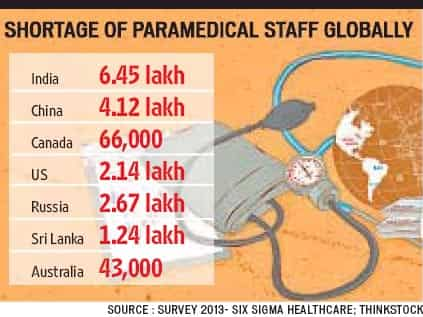At risk
80% paramedics do not have basic training, with many unable to even insert a cannula in a patient, doctors tell Jeevan Prakash Sharma and Gauri Kohli in the concluding part of our series on paramedical education
Apart from a few top hospitals, 80% paramedical staff engaged in emergency healthcare in hospitals do not have basic infection control training, with doctors admitting that 80% paramedics also do not know how to insert a cannula (tube for delivering or removal of fluid) in a patient.

“The less said about the standards of paramedical training in our country, the better. People have opened shops to make money and not to train people properly and it’s unfortunate to know that they don’t have any concern for a patient’s life. A student can’t learn unless you make him or her practice various important medical procedures, but that would mean increased training costs. Institutes don’t want to spend money on providing essentials for training such as syringes, sanitisers, gloves and cannulas. How will students then learn how to administer injections or take blood for testing?” asks Dr O P Yadav, CEO, National Heart Institute, Delhi.
Other doctors agree and Alok Srivastava, head, integrated emergency response service, (IERS), training and academics and research, Fortis Healthcare, says, “It’s sad to see that skills of paramedical candidates passing out of private institutes are below par. This is because many such institutes don’t have faculty, training equipment and infrastructure. Quality control comes later. First, we need to have even the most basic things made available in these institutes.”

So how do hospitals cope for the shortage of adequately trained staff? “We don’t set recruits to work immediately. They are first given specialised training to enable them to get well-versed in performing paramedical services,” says Rajneesh Kapoor, senior director, interventional cardiology, Medanta Medicity.
Unfortunately, medium and small hospitals that cannot afford the luxury of specially equipping staff with better skills have to make do with the new hires they get. “A majority of hospitals have unskilled nursing and paramedical staff. These are people who attend to patients round-the-clock while doctors come in twice a day for a few minutes just for routine checks. It’s a sad state of affairs,” says Kapoor.
For improving the skills of their paramedics, a few top hospitals have associated with the Indian Medical Association (IMA) to start specialised programmes. “We have diploma programmes in medical laboratory technology, X-ray and imaging, medical record technology and operation theatre technology course in collaboration with IMA,” says Maj Gen (Dr) L R Sharma (retd), additional director medical services, Indraprastha Apollo Hospitals. The hospital has about 320 paramedical staff in various departments. Another option for other hospitals is recruiting paramedics from reputed and government-recognised institutes though a proper screening process so treatment of patients is not compromised with.
“We recruit paramedical staff from various leading institutes and universities like colleges of Delhi University, Hamdard University and some private institutions affiliated with various universities in and around Delhi, especially in Punjab and Haryana,” says Malvika Varma, senior vice president- human resources, Max Healthcare.
Max Hospital, for instance, has 1100 paramedical staff working in specialist areas such as physiotherapy, emergency medical technicians, pathology technicians, radiology technicians, OT technicians, pharmacists, blood banks, and so on.
Even government hospitals like the All India Institute of Medical Sciences, Ram Manohar Lohia etc hire paramedics from government-recognised and well-known colleges such as University Colleges of Medical Sciences (Delhi University) etc.
Rs. 35,000 per semester, no recognition
When Upasana Sharma opted for a two-year diploma in medical lab technology from a Delhi-based institute three years ago, she was told that the course was affiliated to institutions such as Punjab Technical University, Karnataka State Open University and Uttarakhand Open University. Now working with a diagnostic chain, she says she was not aware that the institute did not have proper recognition. “I paid Rs. 35,000 per semester for the programme,” she says. Medical experts blame skill drain to UAE, US, UK for the shortage of paramedics in India. “The government must rectify the bad standards of healthcare due to poor training, faculty, infrastructure and migration of skilled workforce,” says Rajneesh Kapoor, senior director, interventional cardiology, Medanta Medicity.











